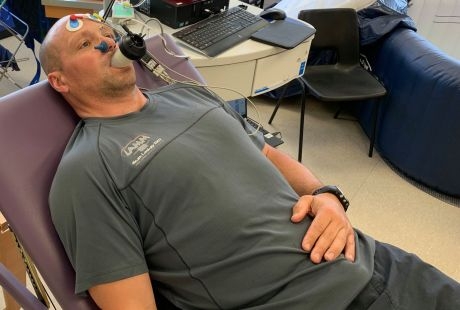
Researchers from the University of Portsmouth are aiming to test the limits of human endurance by working with Neil Hunter, who is undertaking a solo unsupported, unassisted expedition to Antarctica.
Neil is taking part in a trial conducted by PhD students Tom James and Jennifer Wright from the School of Sport, Health and Exercise Science into how Neil’s expedition will affect his type 2 diabetes mellitus, metabolic, cardiovascular, and nerve function.
Using the University’s Extreme Environments Laboratory, Tom and Jennifer will test Neil's base level function before his expedition, and after, measuring things such as glucose tolerance, fuel utilisation, and vascular function. Neil will be given monitors to take with him while in the South Pole to record blood glucose levels throughout his expedition.
On the way I will encounter crevasses, snowdrifts and sastrugi (wind-formed ridges and waves of ice). There will be an almost constant head wind reaching speeds of up to 60 mph with blizzards and white out conditions.
Neil Hunter, Advencher
Tom and Jennifer said: “Neil’s expedition offers a unique opportunity to investigate the impact that living and working in this extreme environment has on an individual living with type 2 diabetes mellitus. We will conduct a variety of tests, using state of the art equipment and laboratories, before and after Neil’s expedition. We will then analyse the data for any physiological changes that have occurred over the course of the expedition. The tests will include measuring potential changes in Neil’s glucose tolerance, insulin sensitivity, fuel utilisation, biomarkers, cardiovascular, and neural health.
“The results of this research could help further our understanding of how people living with type 2 diabetes mellitus respond to living and working in extreme environments. Previous research has shown that there are significantly higher reported health problems and mortality rates in individuals with type 2 diabetes mellitus living and working in cold climates. With the incidence of type 2 diabetes rapidly increasing worldwide, gaining more knowledge in this area is becoming increasingly paramount.”
Starting in November, Neil’s expedition involves a solo unsupported, unassisted man haul from Hercules Inlet on the coast of the continent all the way to the South Pole.
The journey is in excess of 700 miles and it is anticipated to take 45 to 50 days. He will be hauling a pulk (sledge) weighing somewhere in the region of 100kgs containing all his food, fuel and equipment.
Neil’s expedition offers a unique opportunity to investigate the impact that living and working in this extreme environment has on an individual living with type 2 diabetes mellitus.
Tom James and Jennifer Wright, PhD students from the School of Sport, Health and Exercise Science
Neil said: “Starting at sea level, it will be uphill all the way to the South Pole which is at an elevation of almost 3000 metres.
“On the way I will encounter crevasses, snowdrifts and sastrugi (wind-formed ridges and waves of ice). There will be an almost constant head wind reaching speeds of up to 60 mph with blizzards and white out conditions.
“Oh, and it will be cold too – temperatures at the South Pole fall as far down as minus 45 degrees Celsius.”
Neil is currently serving as a Police Officer in the Ministry of Defence Police Marine Unit in Portsmouth. He was formerly a Royal Navy engineer having served for 17 years, the majority of which were in the submarine service. However, after being diagnosed with type 2 diabetes he was medically discharged.
Neil said: “This was a bit of a life changer so I took the decision to take a year out, buy a boat and take part in the Woodvale Atlantic Rowing Race in 2007 with friend Scott McNaughton.
It took us 67 days but we raised £20,000 for Diabetes UK and much needed awareness of the condition and the charity. With this, I showed that although diabetes affected my life, it did not inhibit it. Since then I have been fortunate to undertake numerous expeditions around the world including Denali (highest mountain in North America), Skiing across the Greenland icecap from East to West coast (over 350 miles) and Elbrus (highest mountain in Europe) to name a few.”
To follow Neil's progress, visit his website, Facebook page or Just Giving page.
